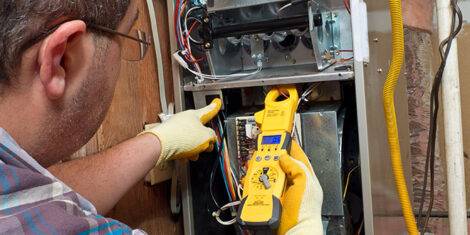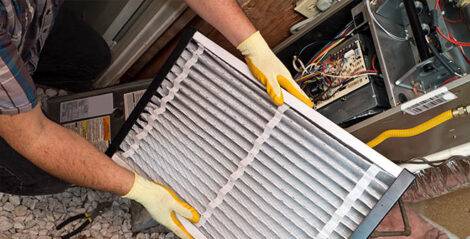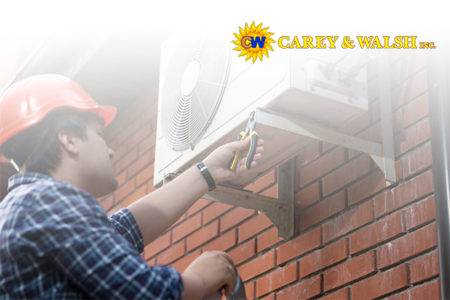
In Briarcliff Manor, NY, where the seasons bring their own set of challenges, ensuring your HVAC unit is in peak condition is crucial for comfort. Understanding the most common heating and air conditioning repairs can help homeowners and business owners anticipate needs and act promptly to maintain a comfortable indoor environment year-round.
1. Air Filter Replacement

Why It’s Needed: Air filters trap dust, pollen, and other airborne particles, preventing them from entering the HVAC system and indoor air. Over time, these filters can become clogged, leading to reduced airflow. This not only decreases the system’s efficiency, causing it to work harder and use more energy, but also negatively impacts indoor air quality, which can exacerbate allergies and respiratory issues.
Signs: Noticeable signs of dirty filters include reduced airflow from vents, increased dust accumulation within the home, higher than usual energy bills, and uneven heating or cooling in different rooms. The system may also cycle more frequently, trying to reach the desired temperature. Always replace air filters regularly.
2. Thermostat Malfunctions
Why It’s Needed: The thermostat is the control center for your HVAC system, dictating when and how the system heats or cools your home. Incorrect readings due to a malfunctioning thermostat can lead to significant comfort issues, with the system not activating when needed or cycling too frequently, which can also lead to increased wear and tear on the system.
Signs: Common indicators include the HVAC system not starting despite being set to heat or cool, the system cycling on and off more frequently than normal (short cycling), or the indoor temperature not reaching the set point on the thermostat.
3. Refrigerant Leaks
Why It’s Needed: Refrigerant is the substance that your air conditioner uses to remove heat and humidity from the air in your home. A leak in the system can lead to a loss of cooling power, as there is not enough refrigerant to effectively remove heat. This can significantly reduce the efficiency of your system and increase operating costs.
Signs: The air conditioner blowing warm air, hissing noises coming from the unit (indicating a leak), ice formation on the compressor outside, or fluctuations in cooling performance are all signs of possible refrigerant leaks.
4. Drainage Issues
Why It’s Needed: As air conditioners and high-efficiency furnaces operate, they extract moisture from the air, which is then expelled through a condensate drain line. If this line becomes clogged or the drain pan is full, it can lead to water leaks and potential water damage. Additionally, improper drainage can increase indoor humidity levels, affecting comfort and potentially promoting mold growth.
Signs: Water pooling around the furnace or air conditioner, an increase in indoor humidity levels, or visible leaks during operation are key indicators of drainage problems.
5. Ignition Problems
Why It’s Needed: For a gas furnace to heat your home, it must first ignite the gas in the combustion chamber. Problems with the ignition system, such as a faulty igniter or pilot light issues, can prevent the furnace from starting, leading to no heat being produced.
Signs: The furnace not igniting, producing intermittent heat, or the pilot light turning yellow (indicating incomplete combustion) are signs that there may be an issue with the furnace’s ignition system.
6. Blower Motor Failure
Why It’s Needed: The blower motor plays a crucial role in circulating heated or cooled air throughout your home. If it fails, air will not be properly distributed, leading to no airflow and uneven temperatures in your home.
Signs: A lack of airflow from vents, the blower motor running continuously without blowing air, or unusual noises such as grinding or humming from the furnace can indicate a blower motor issue.
7. Capacitor or Contactor Issues
Why It’s Needed: Capacitors store the electrical energy needed to start the compressor and fans, while contactors are electrical switches that control the power supply to these components. Failure of either can prevent your HVAC system from starting or operating efficiently.
Signs: The air conditioner not starting, emitting humming noises without the fan or compressor turning on, or the unit blowing warm air due to the compressor not activating.
8. Worn or Faulty Belts
Why It’s Needed: In systems that use a belt-driven blower, the belt is critical for connecting the motor to the blower. Over time, belts can wear out or break, leading to a loss of airflow.
Signs: Squealing noises from the furnace when the blower is running, the blower not working despite the motor running, or the system overheating due to the blower not circulating air are indicative of belt problems.
9. Evaporator and Condenser Coil Cleaning
Why It’s Needed: The evaporator and condenser coils are key components in the heat exchange process. Over time, these coils can become dirty, reducing their ability to transfer heat and thereby decreasing the overall efficiency and cooling capacity of the system.
Signs: Reduced cooling capacity, the system taking longer to cool the home, or an increase in energy consumption can all be signs that the coils need cleaning.
10. Ductwork Leaks or Blockages
Why It’s Needed: The ductwork is responsible for distributing heated or cooled air throughout your home. Leaks or blockages in the ducts can lead to significant energy loss and reduce the effectiveness of your HVAC system, as well as contribute to uneven heating or cooling.
Signs: Rooms that are consistently too hot or too cold, higher utility bills, and excessive dust in the home can indicate problems with the ductwork.
Understanding these common issues and recognizing their signs can help homeowners in Briarcliff Manor, NY, maintain their HVAC systems more effectively, ensuring comfort and efficiency all year round.
HVAC Repair FAQ Section

How often should my HVAC system be serviced?
It’s recommended to have your HVAC system professionally serviced at least once a year. Ideally, heating systems should be checked in the fall and cooling systems in the spring to ensure they’re operating efficiently and to prevent breakdowns during peak seasons.
Can I perform any HVAC maintenance tasks myself?
Yes, there are several maintenance tasks you can perform, including:
*Replacing or cleaning air filters every 1-3 months.
*Keeping the area around your outdoor unit clear of debris and vegetation.
*Ensuring all indoor vents are unblocked and open for proper airflow.
*Regularly checking and cleaning air vents and registers.
What is the average lifespan of an HVAC system?
The average lifespan of an HVAC system is between 15 to 25 years. However, this can vary based on the system type, brand, usage patterns, and how well it’s maintained.
Why is my HVAC system blowing warm air when set to cool?
This could be due to a variety of issues, including:
*Low refrigerant levels due to leaks.
*Dirty air filters restricting airflow.
*Issues with the thermostat settings.
*Electrical problems affecting the outdoor unit.
*Evaporator or condenser coils being dirty or blocked.
What should I do if I smell gas coming from my furnace?
If you smell gas, it’s important to act immediately:
*Do not try to turn off or on any electrical switches.
*Evacuate the area immediately.
*From a safe distance, call your gas company or emergency services to report the leak.
*Do not return to the area until it has been declared safe by professionals.
How can I improve the efficiency of my HVAC system?
Improving your HVAC system’s efficiency can be achieved through:
*Regular maintenance and servicing.
*Upgrading to a programmable or smart thermostat.
*Sealing and insulating ductwork to prevent energy loss.
*Considering an upgrade to a more energy-efficient model if your system is old.
Is it worth repairing an old HVAC system, or should I replace it?
This depends on several factors, including the age of your system, the cost of repairs, and its current efficiency. If your system is close to or beyond its expected lifespan, or if repair costs are high and the system is inefficient, it might be more cost-effective to replace it. A professional HVAC technician can provide advice based on your specific situation.
Can dirty air filters really affect my HVAC system’s performance?
Yes, dirty air filters can significantly impact your system’s performance by restricting airflow, which can lead to overheating, reduced efficiency, and even system failure. Regularly replacing or cleaning your air filters is one of the simplest and most effective ways to maintain your system’s efficiency.
What does an HVAC service check include?
A typical HVAC service check may include:
*Inspecting and cleaning air filters, blower, and indoor coil.
*Checking the refrigerant level and inspecting for leaks.
*Testing the thermostat calibration and system controls.
*Inspecting electrical connections and components.
*Lubricating moving parts.
*Checking the condensate drain for blockages.
*Inspecting the outdoor unit and clearing debris.
This FAQ section aims to address common concerns and questions regarding HVAC repair and maintenance, providing homeowners with the knowledge needed to ensure their systems remain in optimal condition.
🌟 Is your HVAC system not performing at its best?
Experience the peace of mind that comes with a fully functional heating and cooling system by choosing Carey & Walsh, Inc. for your repairs. Serving Briarcliff Manor, NY, and surrounding areas, we’re here to tackle everything from filter replacements to complex repairs. Schedule your service today and enjoy a comfortable, efficient home all year round! 🏡💼



